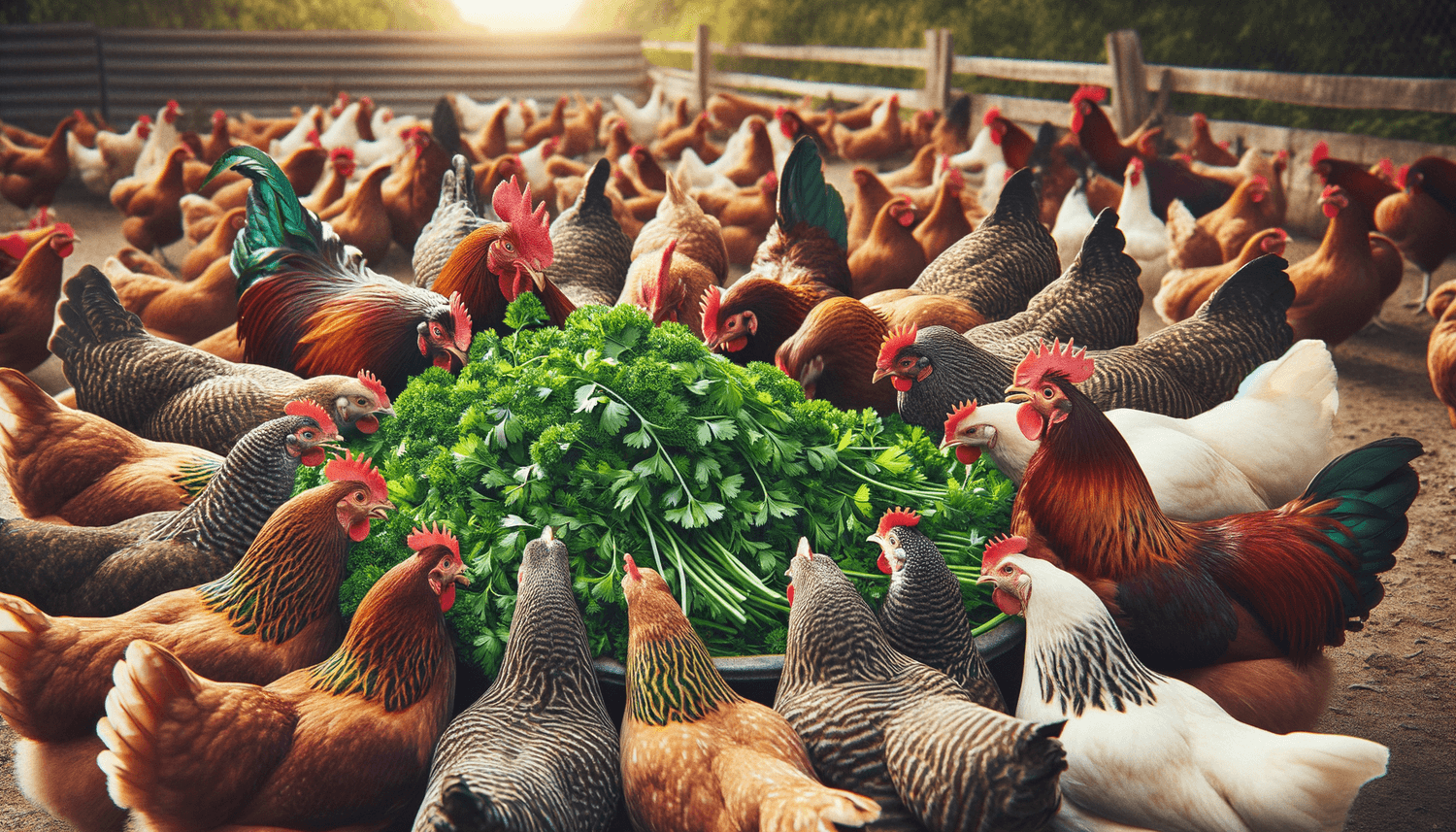Hey there, all you poultry enthusiasts! Have you ever been chopping up some fresh parsley for your dinner, and as feathery little eyes peek over from the backyard, found yourself wondering if your clucking companions could join you in enjoying that verdant goodness? Flutter into today’s blog post, where we’ll not only let you know if those lovely ladies can eat parsley, but also dig into the importance of a balanced diet, the potential benefits and/or risks, nutritional value, and how to prepare this delicious herb for your egg-laying pals. So spread your wings and let’s explore the world of chickens and parsley together!
Can chickens eat parsley?
Yes, chickens can indeed eat parsley, and it’s perfectly safe for them! Parsley is a nutritious treat for your feathery friends, with plenty of vitamins, minerals, and antioxidants to give them added immune support. Integrating parsley into their diet can be an excellent way to provide variety and boost their overall health.
Finding balance in a chicken’s diet
Just like us humans, chickens need a balanced diet to ensure they are receiving all the essential nutrients to stay healthy and thrive. A chicken’s diet should primarily consist of high-quality chicken feed, which should make up around 80-90% of their diet. This chicken feed is expertly formulated to provide everything your feathered friends need to maintain their optimal health.
The remaining 10-20% of a chicken’s diet can consist of various treats, like fruits and vegetables, which can provide additional nutritional value as well as some tasty excitement for your poultry pals. Including these treats can help make sure your chickens are not only happy, but also getting a balanced and varied diet that takes care of their nutritional needs.
Nutritional value of parsley for chickens.
Parsley is indeed a wonderful treat for chickens, and it comes loaded with plenty of nutritional benefits. This versatile herb contains an abundance of vitamins, such as vitamin A, C, and K, which are essential for keeping your chickens’ immune systems strong and helping them maintain good vision and proper cellular functions.
In addition to vitamins, parsley is also packed with minerals like calcium, iron, and potassium. Calcium contributes to a healthy eggshell formation, while iron and potassium support overall energy levels and optimal cardiovascular health in your flock. Meanwhile, the natural antioxidants found in parsley can help protect your chickens’ cells from damage and promote their overall health.
Feeding your chickens parsley can also contribute to their hydration, as it contains a good amount of moisture that can help quench their thirst. This is particularly important during warmer weather when chickens may be seeking extra sources of water to stay cool and hydrated. All in all, parsley offers numerous nutritional benefits for your poultry friends and can be a delightful addition to their diet.
Nutrition table of parsley for chickens.
| Information | Description |
|---|---|
| Nutritional Value | Rich in vitamins A, C, and K, along with minerals like calcium, iron, and potassium |
| Suggested Serving Size | A handful of fresh parsley mixed in with their regular feed |
| Safe Feeding Practices | Ensure parsley is thoroughly washed and pesticide-free before feeding |
| Preparation | Chop the parsley into smaller pieces for easy consumption |
| Potential Risks | Minimal risks, but moderation is key as too much can lead to digestive issues |
| Hydration | Contains moisture that can assist in keeping chickens hydrated |
| Digestion | Aids in healthy digestion due to its natural fiber content |
| Seasonal Availability | Best enjoyed during spring and summer, but available year-round in some regions |
| Other Benefits | Offers immune-boosting effects, promotes cellular health, and supports cardiovascular health |
Introducing parsley to your chickens’ diet
When introducing parsley to your chickens, it’s best to start slowly and monitor how they react to the new treat. Begin by offering a small amount of chopped parsley mixed with their regular chicken feed. This way, they will become familiar with the taste and texture while still receiving the proper nutrition from their main feed.
Always ensure the parsley is thoroughly washed and free from any pesticides or chemicals, as these can be harmful to your chickens. Organic parsley, if available, is a great option as it minimizes possible exposure to harmful substances.
Discovering other chicken-friendly treats
Once your chickens develop a taste for parsley, you can also explore other fresh herbs and leafy greens that offer similar nutritional benefits. Some examples include cilantro, dill, and kale. Like parsley, these greens can be a nutritious addition to your chickens’ diet and can help support their overall health.
It’s essential always to remember that moderation is key when introducing any new treat or change to their diet. Keeping a healthy balance between chicken feed and other edible goodies ensures your backyard flock remains happy and well-fed.
Happy chickens, happy owners
In summary, not only can chickens safely enjoy parsley, but it is also a beneficial treat for them. By incorporating fresh herbs like parsley into your chickens’ diet, you are enhancing their nutrient intake, providing immune support, and promoting overall good health. Just remember to keep a balance between their primary chicken feed and these tasty treats, and enjoy the process of discovering new and exciting additions to their diet. Happy chickens make for happy owners, and a little bit of parsley can go a long way in achieving that goal.

















